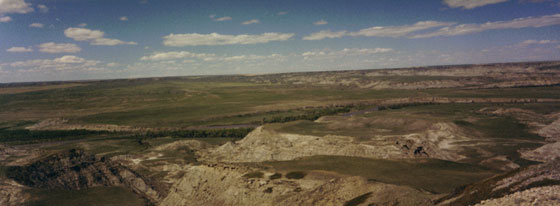Prairie Nocturne Background Notes
How did you develop the idea of "Prairie Nocturne," and what are the connections between it and your earlier novels?
Two of the three main characters — Wes and Monty — are freshly created. Susan Duff — I knew I was going to use her again sometime, after I had the colossal good luck to create her as a 9-year-old schoolgirl in "Dancing at the Rascal Fair". I wanted to find out what became of her when she grew up. I thought, I'm going to burnish this singing voice some more, give her a singing career and one as a music teacher.
From day one, I said, this is going to be a book about motives. The underlying question is — why is Wes being such a sugar daddy? (Wes Williamson finances the training and career ascent of Monty, his chauffeur).
I like the notion of motives. I take it back to the Latin root, to move — that's what a writer is trying to do, to move the action along, to move the reader as well.
Talk a bit about Monty, who would have been one of only a few African Americans in the Montana of that place and time.
In the part of Montana I was born into ... the parallel is in a single word, "aloneness." Or as Monty says; "dead-dog alone." How singular his life was as an African American on that ranch and in that entire imagined county.
 |
| The Montana prairie, not uniformly flat, is a study in aloneness. |
There is a career parallel — when I was just a kid there was a minor vivid character, Taylor Gordon, in the county, an African-American singer who did make it in an almost comet arc, complete with descent, to New York and back in the late 1920s. There have been a few of us who have made it out of Meagher County on the strength of voice — myself, Gordon, also Dirk Benedict, an actor. You wouldn't have bet the mortgage on any of us rising on the strength of voice.
As for Monty's family, I came across a one- or two-sentence entry in a newspaper in the late 1890s. "Lieutenant (John "Black Jack") Pershing and his black troopers drove a band of Crees through town today." Out of that came Monty's background as the offspring of a sergeant and washerwoman.
There were black regiments out of the Ninth and the Tenth cavalries. They came out of the Civil War — they were freedmen. The Tenth was in the Southwest in heavy Indian fighting. They wound up in Fort Assinniboine, arriving in the middle of a blizzard. I saw this as a chance to get at some of the moral complications of the West — black troopers herding homeless Indians back to Canada.
I was determined that Monty was not going to be that well-intentioned character, the rise-and-fall cliché. I didn't want this to be a story where a character goes up a steep ladder until he misses a step, and — blam.
Scott Fitzgerald said "there are no second acts in American life" but I think America is jampacked with second acts. These are grown-up people trying to make decisions, navigating life.
The ways up and out interest me as a writer — poor Spanish kids trying to turn themselves into bullfighters. Jewish boxing champions. Music for black kids. A friend of mine from rural Iowa, a white boy, found that engineering was the way to rise quickly in one generation.
Both Carol and I are Northwestern journalism grads. My whole family was ranch hands. I got through college on full tuition and a dishwashing job. I went from newspapering, magazines, a doctorate in history, free-lance writing, then books. I believe in second acts.
What's the history of the Klan in Montana?
After World War I and through the 1920s, there was a secondary surge of the Klan out of the South. ... It was a fairly quick, broad flicker across the state. It was anti-Catholic and anti-immigrant. It had its ludicrous sides — the Butte chapter turned down an Indian because he wasn't American enough. It's one of those patterns in the rug: You just have to see it. The New Deal blew it out in the 1930s — it was back to being a Southern ailment.
There's a lot of music and singing in "Prairie Nocturne," from Monty's spirit songs, derived from slave field songs, to Susan's compositions. Where do they come from?
The field songs are one of the great art forms. One of the great emergences in the Harlem Renaissance was old songs done by spectacular new voices, spread by radio, movies and the theater circuit.
But most of the songs in "Prairie Nocturne" I wrote — the songs Susan wrote, the ballad of the Tenth Cavalry, Monty's spirit songs. That's me as a closet poet.The one hole card Monty had in life was his spirit songs. He has to get them from somewhere — he got them from me. As for "Silver Dollar Blues", that’s from silver dollars stacked on the bars of White Sulphur Springs when I was young.
It's a kind of ventriloquism. If it didn't exist, it might as well have. There's this aphorism Susan resorts to in the book — "the beautiful contradiction of love is that it is a fidelity beyond truth, which is merely occasional." That was me. It was meant to be a brain teaser, making the reader think — is that Lord Byron, or what?
Synopsis | Discussion Points | Background Notes